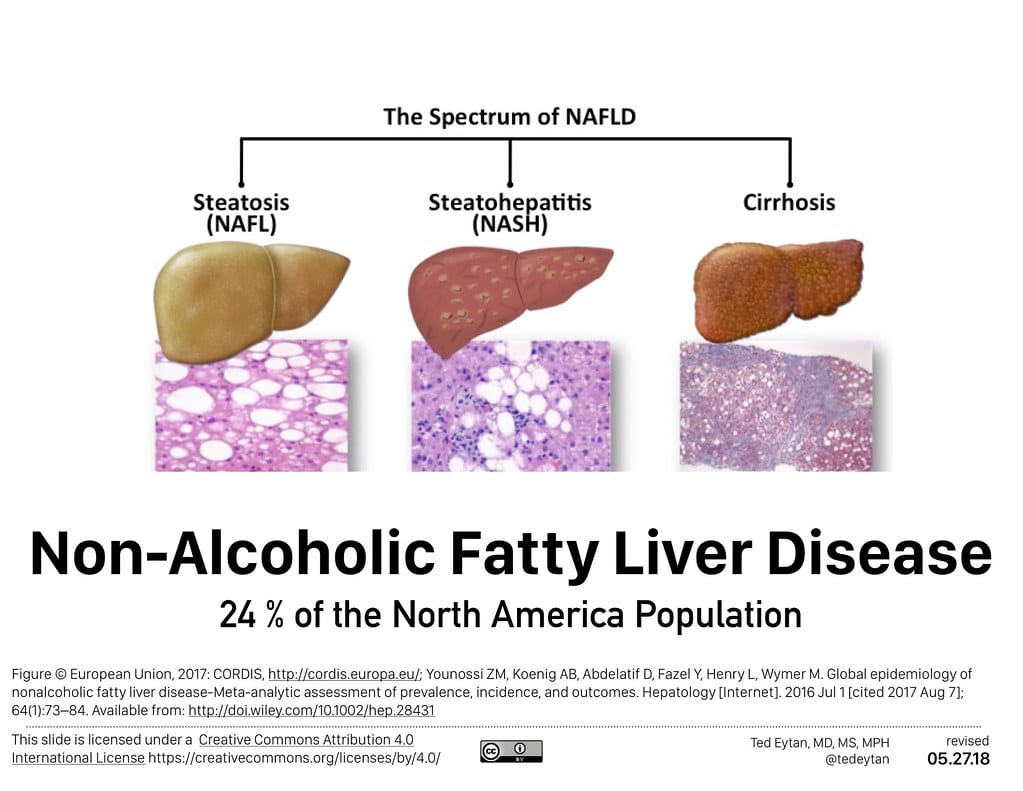Fatty Liver and Dementia
Introduction
Fatty Liver can be caused by alcohol use, but it can also happen in people who don’t drink or use very little alcohol.
Called “NAFLD” (Non-Alcoholic Fatty Liver Disease”), it affects 25 to 30 percent of people in the US and Europe.
Recent studies link NAFLD with cognitive impairment and dementia. This can occur even with no other symptoms.
You may or may not develop symptoms from NAFLD. The most common symptoms are feeling tired or discomfort or pain in the upper right side of your abdomen.
However, your only symptom may be a loss of short-term memory and slowed-down thinking. Studies are showing that NAFLD may also cause Alzheimer’s Disease.
If you’re wondering what has happened to your previously sharp mind, this is a possible answer.
NAFLD should not be ignored in any case, as it can lead to cirrhosis, a severe and potentially fatal disease.
Subscribe Now! Get More Health Info

What Causes Fatty Liver?
Eating sugar, refined carbs (bread, cakes, rice, pasta, potatoes), and bad fats (fried foods, chips) creates a risk for Fatty Liver.
- The same process that causes Type II diabetes also can cause Fatty Liver Disease. If you’re “Pre-diabetes” or a diabetic, you’re at risk.
- High levels of fat (especially triglycerides) in your blood.
- Overweight
What to do about Fatty Liver Disease
As with most chronic illnesses, NAFLD has different causes in each person. If you want to get the problem handled, you’ll need to be tested to determine the exact problem causing your body stress and preventing it from healing. Go HERE to get started on this process.
DIY NAFLD Improvement:
(See article below for more information):
1: Lose excess weight–losing between 7 and 10 percent of body weight can improve other symptoms of NAFLD, such as inflammation, fibrosis, and scarring
2: Research from 2017 suggests that the Mediterranean diet may help to reduce liver fat, even without weight loss.
3: Exercise: It’s important to stay active when you have NAFLD. A good goal to shoot for is at least 150 minutes of moderate-intensity exercise per week.
4: Avoid foods with added sugars-Dietary sugars such as fructose and sucrose have been linked to NAFLD development.
5: Take an omega-3 supplement–A peer review study suggests that taking an omega-3 supplement may reduce liver fat.
6: Avoid known liver irritants–Certain substances can put excess stress on your liver. They include alcohol and certain over-the-counter medications.
7: Consider taking vitamin E--Vitamin E is one antioxidant that may reduce inflammation caused by NAFLD. Must take all components of vitamin E. This would include Mixed Tocopherols and Tocotrienols
8: Consider Herbs--A 2018 paper identified certain herbs, supplements, and spices that have been used as alternative treatments for NAFLD. Compounds that have positive effects on liver health include turmeric, milk thistle, resveratrol, and green tea.
I hope this helps!
Dr. Melodie Billiot
How to avoid toxic fats that cause Fatty Liver
READ: Have Toxic Seed Oils Torched Your Body?
NAFLD and Dementia
Ronald Grisanti D.C., D.A.B.C.O., DACBN, MS, CFMP
A study from the journal Neurology revealed that nonalcoholic fatty liver disease (NAFLD) is independently associated with cognitive impairment.
Nonalcoholic fatty liver disease (NAFLD) is an umbrella term for various liver conditions affecting people who drink little to no alcohol. As the name implies, the main characteristic of NAFLD is too much fat stored in liver cells.
Dementia and NAFLD are two frequent conditions that share underlying risk factors mainly in the realm of metabolic disease.
The study from the journal, Neurology included 4,472 adults aged 20–59 years.
The participants underwent assessment of liver enzyme activity and hepatic steatosis by ultrasound. They underwent cognitive evaluation using the following computer-administered tests: the Simple Reaction Time Test (SRTT), the Symbol-Digit Substitution Test (SDST), and the Serial Digit Learning Test (SDLT).
Increased activity of the liver enzymes alanine aminotransferase (ALT) and aspartate aminotransferase (AST) correlated with lower performance on the SDLT, while increased alanine aminotransferase was also correlated with lower performance in the SDST.
The current studies suggest that NAFLD patients incur cognitive dysfunction.
Although if left untreated, NAFLD can lead to much more serious conditions, including cirrhosis and liver failure. The good news is that fatty liver disease can be reversed—and even cured.
8 Steps to Effectively Treat Fatty Liver Disease
1: Lose excess weight–losing between 7 and 10 percent of body weight can improve other symptoms of NAFLD, such as inflammation, fibrosis, and scarring
2: Research from 2017 suggests that the Mediterranean diet may help to reduce liver fat, even without weight loss.
3: Exercise: It’s important to stay active when you have NAFLD. A good goal to shoot for is at least 150 minutes of moderate-intensity exercise per week.
4: Avoid foods with added sugars-Dietary sugars such as fructose and sucrose have been linked to NAFLD development.
5: Take an omega-3 supplement–A peer review study suggests that taking an omega-3 supplement may reduce liver fat.
6: Avoid known liver irritants–Certain substances can put excess stress on your liver. They include alcohol and certain over-the-counter medications.
7: Consider taking vitamin E--Vitamin E is one antioxidant that may reduce inflammation caused by NAFLD. Must take all components of vitamin E. This would include Mixed Tocopherols and Tocotrienols
8: Consider Herbs--A 2018 paper identified certain herbs, supplements, and spices that have been used as alternative treatments for NAFLD. Compounds shown to have positive effects on liver health include turmeric, milk thistle, resveratrol, and green tea.
Compliments from Functional Medicine University
References
https://www.ncbi.nlm.nih.gov/pmc/articles/PMC4820136/
https://www.ncbi.nlm.nih.gov/pmc/articles/PMC7400092/
https://aasldpubs.onlinelibrary.wiley.com/doi/pdf/10.1002/hep.22752
https://www.hindawi.com/journals/grp/2016/1459790/
https://www.ncbi.nlm.nih.gov/pmc/articles/PMC5789322/


